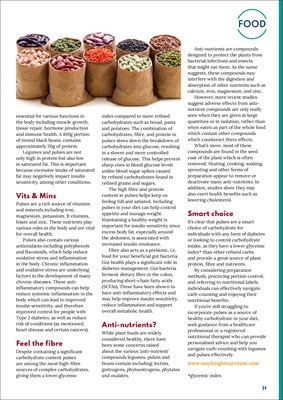
31
FOOD
essential for various functions in
the body including muscle growth,
tissue repair, hormone production
and immune health. A 100g portion
of tinned black beans, contains
approximately 20g of protein.
Legumes and pulses are not
only high in protein but also low
in saturated fat. This is important
because excessive intake of saturated
fat may negatively impact insulin
sensitivity, among other conditions.
Vits & Mins
Pulses are a rich source of vitamins
and minerals including iron,
magnesium, potassium, B vitamins,
folate and zinc. These nutrients play
various roles in the body and are vital
for overall health.
Pulses also contain various
antioxidants including polyphenols
and flavonoids, which help reduce
oxidative stress and inflammation
in the body. Chronic inflammation
and oxidative stress are underlying
factors in the development of many
chronic diseases. These antiinflammatory
compounds can help
reduce systemic inflammation in the
body which can lead to improved
insulin sensitivity, and therefore
improved control for people with
Type 2 diabetes, as well as reduce
risk of conditions (as mentioned,
heart disease and certain cancers).
Feel the fibre
Despite containing a significant
carbohydrate content pulses
are among the most high-fibre
sources of complex carbohydrates,
giving them a lower glycemic
index compared to more refined
carbohydrates such as bread, pasta
and potatoes. The combination of
carbohydrates, fibre, and protein in
pulses slows down the breakdown of
carbohydrates into glucose, resulting
in a slower and more controlled
release of glucose. This helps prevent
sharp rises in blood glucose levels
unlike blood sugar spikes caused
by refined carbohydrates found in
refined grains and sugars.
The high fibre and protein
content in pulses helps keep us
feeling full and satiated. Including
pulses in your diet can help control
appetite and manage weight.
Maintaining a healthy weight is
important for insulin sensitivity since
excess body fat, especially around
the abdomen, is associated with
increased insulin resistance.
Fibre also acts as a prebiotic, i.e,
food for your beneficial gut bacteria.
Gut health plays a significant role in
diabetes management. Gut bacteria
ferment dietary fibre in the colon,
producing short-chain fatty acids
(SCFAs). These have been shown to
have anti-inflammatory effects and
may help improve insulin sensitivity,
reduce inflammation and support
overall metabolic health.
Anti-nutrients?
While plant foods are widely
considered healthy, there have
been some concerns raised
about the various 'anti-nutrient'
compounds legumes, pulses and
beans contain including; lectins,
goitrogens, phytoestrogens, phytates
and oxalates.
Anti-nutrients are compounds
designed to protect the plants from
bacterial infections and insects
that might eat them. As the name
suggests, these compounds may
interfere with the digestion and
absorption of other nutrients such as
calcium, iron, magnesium, and zinc.
However, more recent studies
suggest adverse effects from antinutrient
compounds are only really
seen when they are given in large
quantities or in isolation, rather than
when eaten as part of the whole food
which contain other compounds
which counteract there effects.
What's more, most of these
compounds are found in the seed
coat of the plant which is often
removed. Heating, cooking, soaking,
sprouting and other forms of
preparation appear to remove or
deactivate many anti-nutrients. In
addition, studies show they may
also exert health benefits such as
lowering cholesterol.
Smart choice
It's clear that pulses are a smart
choice of carbohydrate for
individuals with any form of diabetes
or looking to control carbohydrate
intake, as they have a lower glycemic
index* than other refined carbs
and provide a great source of plant
protein, fibre and nutrients.
By considering preparation
methods, practicing portion control,
and referring to nutritional labels,
individuals can effectively navigate
carb-counting and enjoying their
nutritional benefits.
If you're still struggling to
incorporate pulses as a source of
healthy carbohydrate in your diet,
seek guidance from a healthcare
professional or a registered
nutritional therapist who can provide
personalised advice and help you
navigate carb-counting with legumes
and pulses effectively.
www.mayknightnutrition.com
*glycemic index